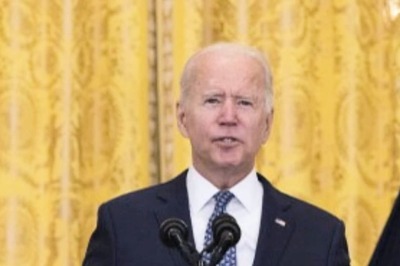
views
WASHINGTON: Jonathan Dekel-Chen dreams of the moment when his abducted 35-year-old son, Sagui, is reunited with his wife and three young children, including a daughter born two months after the devastating attack on Israel that initiated the war.
Ruby Chen longs to recover the remains of his 19-year-old son, Itay — a soldier who Israeli intelligence says was killed in the Oct. 7 attack — so that he can be buried and his “soul” finally given “a place to rest” in accordance with Jewish practices.
For many Americans, the Israeli-Hamas war is seen through the daily reports of Israeli ground incursions and airstrikes in Gaza and warnings of a looming famine. There are college campuses riven by protests and great uncertainty over cease-fire prospects.
But the families of the Americans taken hostage are laser-focused on one thing: their loved ones. They fear that with all the tumult of the war, Americans often forget about their fellow citizens who remain missing. They’re doing whatever they can to make sure they aren’t forgotten and to keep pushing to get them — or their remains — back home.
“For most of us, we are doers. So we wake up in the morning and we say, what are we doing today? What’s on the agenda?” said Ronen Neutra, whose son, Omer, a soldier, was among those taken. “What can I do to make sure that my son will come back home today?
The families were in Washington this week for meetings with U.S. government officials, including national security adviser Jake Sullivan and Attorney General Merrick Garland, whose Justice Department is investigating the deaths and kidnapping of Americans at the hands of Hamas. The meetings came at a sensitive time as the Biden administration endeavors to get Israel and Hamas to commit to a cease-fire deal to end the eight-month-old war.
Speaking as a group Wednesday to The Associated Press, the families recounted their shared sadness, angst and uncertainty but also their hopes for a resolution that would result in the release of scores of hostages, including their loved ones. Eight Americans are believed to be held by Hamas, including three who were killed.
The three-part proposal announced on May 31 by President Joe Biden calls for a “full and complete cease-fire,” a withdrawal of Israeli forces from densely populated areas of Gaza and the release of hostages — first, women, the elderly and the wounded and later, all remaining captives, including male soldiers like Neutra, who was ambushed and pulled from a tank on Oct. 7.
“The only way they are going to emerge alive from these tunnels is through some sort of negotiated agreement with the devil, which is Hamas,” said Dekel-Chen, whose son was kidnapped while protecting his kibbutz, Nir Oz, which endured a disproportionate toll of murders and hostage-taking by Hamas.
“Hamas clearly has to be forced to or coerced to enter negotiations and complete them,” he said, and must decide whether it’s about “perpetual warfare and perpetual suffering of its own people” or about “some better future.” The Israeli government, for its part, must “stay the course” and “put aside any kind of narrow political interests” for the good of the country, he said.
That won’t necessarily be easy, given the possibility that a cease-fire deal would shatter Prime Minister Benjamin Netanyahu’s governing coalition and make him more vulnerable to a conviction in his corruption trial.
Netanyahu says he is committed to bringing the hostages home, but also says he won’t end the war without destroying Hamas. He and hard-liners in his coalition fear a full Israeli withdrawal before reaching this goal could allow Hamas to claim victory and reconstitute itself.
The meetings with American officials were the latest in a series of sit-downs that began last fall, shortly after the Hamas attack in which militants killed some 1,200 people, mostly civilians, and abducted around 250 hostages.
So much has changed since then.
The resulting Israeli assault on Gaza has displaced most of the territory’s population and killed over 36,000 Palestinians, according to the Health Ministry, which does not distinguish between combatants and civilians. Israel has drawn global criticism, with a U.N. court ordering Israel to halt its offensive in the southern city of Rafah, while American universities from Columbia to Stanford have been convulsed by protests.
In Israel, thousands have protested the government, criticizing Netanyahu over his approach to the war and demanding he do more to bring back the roughly 80 hostages believed to be alive, along with the remains of 43 pronounced dead. Many hostage families have been at the forefront of the protest movement.
The American hostage families were measured in discussing the Israeli government’s approach, placing the onus more on Hamas.
And they say the warm embrace they have received from U.S. officials exposes a disconnect with the general American public, which they consider to be more apathetic to their plight and ignorant of the fact that so many hostages remain in captivity.
“I think there’s also a lack of knowledge,” Chen said. “I think the majority of the U.S people are not aware that on October 7th, this was also attack on the United States.”
Compounding the sadness eight months into the war is a steady drip of somber Israeli government announcements of additional hostage fatalities — most recently on Monday, when the military declared four hostages who’d been kidnapped on Oct. 7 as now dead. Adding to the pain, the four men had been seen alive in videos released by Hamas, meaning they died in captivity, possibly from Israeli fire.
Chen spent months hoping his son, an NBA-loving soldier in the Israel Defense Forces, was alive only to learn earlier this year that he had been killed.
“He was taken hostage even though he was killed. Who does that? Savages. Who takes dead people as bargaining chips?” he said.
Andrea Weinstein received similar news after the Israeli government in late December disclosed the deaths of her sister, Judy — previously thought to be among the living hostages — and her husband, Gad Haggai. Weinstein, a teacher with a creative spirit who used puppets to help students find their voices, was on a morning walk with her husband when the attack unfolded, her sister said.
Their bodies remain in Gaza.
Optimistic feelings come in cycles for Omer Neutra’s mother, Orna, who said she could not have imagined eight months ago that the family would still be in the same position. She is hopeful but also guarded.
“October 6, it was a different life,” she said. “Nothing is the same for us.”
Disclaimer: This post has been auto-published from an agency feed without any modifications to the text and has not been reviewed by an editor



















Comments
0 comment